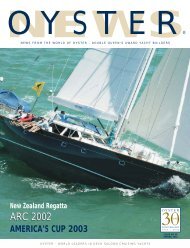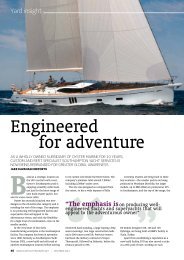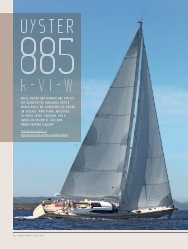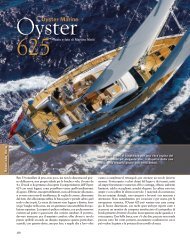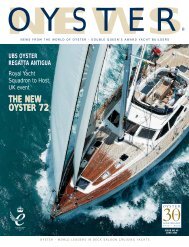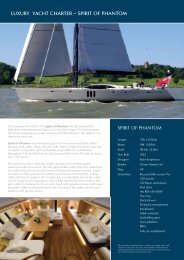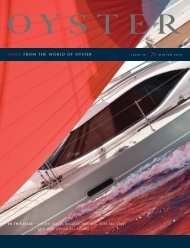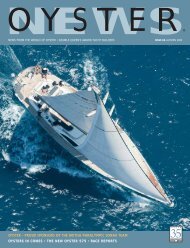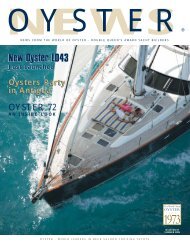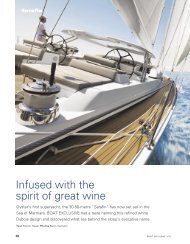Create successful ePaper yourself
Turn your PDF publications into a flip-book with our unique Google optimized e-Paper software.
‘ We’ve had Ferragamo/<br />
Swan regattas here, and<br />
Rolex/Farr 40 meetings,<br />
and we have a UBS/<br />
<strong>Oyster</strong> regatta coming in<br />
July, 2004. An <strong>Oyster</strong><br />
owner for 15 years,<br />
Amherst is looking<br />
forward to that.<br />
’<br />
32 www.oystermarine.com<br />
computer instead. In the meantime, his<br />
growing attraction for a young woman named<br />
Elisabeth Merriman, from Surrey, resulted in<br />
their marriage in1965.<br />
"I got to know him opening the mail," Peter<br />
Seal says. "In those days we had<br />
communications by cable, but most<br />
everything was done by mail, and every<br />
morning there was a huge pile of mail<br />
dumped on the conference table. There<br />
would be Hugh and me in this grand room<br />
with 20 leather chairs, opening the mail and<br />
sorting it by department. In those days one<br />
started at the bottom. Then we moved on to<br />
the decoding of cables, because everything<br />
was in code for security and brevity. We used<br />
to complain to one another over lunch."<br />
Those in shipping are quick to let you know it<br />
is the world’s second oldest profession, and<br />
they wear on their sleeves the pride of the<br />
history, tradition, and adventure that still<br />
surrounds it. Gone are the days when the<br />
success of every voyage was uncertain. But<br />
in spite of all the electronics, and deterrents<br />
like the Automatic Identification System now<br />
required for ships between 300 and 50,000<br />
gross registered tons, pirates continue to<br />
stalk the shipping lanes with a startling<br />
degree of success. And storms wreck havoc<br />
with older vessels.<br />
As communication improved, the management<br />
side of the business got tougher. Even in the<br />
1960s Peter Seal recalls frequenting the Baltic<br />
Exchange with Hugh Amherst, where all<br />
shipping deals had been done in person since<br />
the 1700s. Amherst had become a broker,<br />
buying and selling ships at Galbraith<br />
Wrightson. At The Exchange, owners, brokers,<br />
shippers, and insurance principals met over<br />
coffee (or brandy) to parlay bits of valuable<br />
information, match available ships with cargo,<br />
and drum up all manner of deals. But with the<br />
rapid succession of telex, fax, email, and the<br />
cell phone, the grand congeniality of the<br />
business evolved into a more stressful,<br />
breakneck pace.<br />
"It’s a very competitive business," Peter Seal<br />
says. "You need a killer instinct, because at<br />
the end of the day you do have to win. Big<br />
money is involved. One of our ships recently<br />
sold for $18 million, with a commission of<br />
1%. A new 100-tonner costs $40 million. And<br />
the clients are worldwide. From New York to<br />
Tokyo someone is always awake and ready<br />
to make a deal. It breaks some people. They<br />
begin drinking heavily. Some broker’s wives<br />
sleep in a separate room so they won’t be<br />
disturbed when the phone rings at all hours.<br />
The cell phone helps. Before, you always<br />
worried when you left the office."<br />
After Amherst moved to E.A. Gibson, Seal<br />
says he did a lot of deals with his old friend,<br />
who he says is a tough competitor. "If I could<br />
convince Hugh about a deal, that meant I<br />
could convince the owner," Seal says with a<br />
laugh. Most memorable were the deals they<br />
didn’t do. Seal recalls being in Italy on<br />
holiday having told Amherst not to worry,<br />
there would be no business done while he<br />
was away. But an owner rang him about a<br />
specific ship he heard was on the market.<br />
"There were certain areas Hugh wasn’t<br />
involved in, and this was one of them," Seal<br />
says. "So I bought the ship for my client.<br />
Hugh had a bloody fit. He screamed at me<br />
on the phone. ‘Why didn’t you tell us!’ I told<br />
him the perfect ship was right there in front of<br />
me. He protested, said he could have come<br />
up with an alternative. He was emotional if he<br />
lost a deal. It wasn’t just the money. He’d lost<br />
the game." His sailing friends say that<br />
Amherst’s killer instinct can also reveal itself<br />
over a game of table football.



